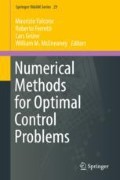Abstract
We propose an “optimize-then-discretize” approach for the numerical solution of optimal control problems for systems with delays in both state and control. We first derive the optimality conditions and an explicit representation of the gradient of the cost functional. Then, we use explicit discretizations of the state/costate equations and employ general-purpose Non-Linear Programming (NLP) solvers, in particular Conjugate Gradient or Quasi-Newton schemes, to easily implement a descent method. Finally, we prove convergence of the algorithm to stationary points of the cost, and present some numerical simulations on model problems, including performance evaluation.
Access this chapter
Tax calculation will be finalised at checkout
Purchases are for personal use only
References
Angell, T.S., Kirsch, A.: On the necessary conditions for optimal control of retarded systems. Appl. Math. Optim. 22, 117–145 (1990)
Banks, H.T.: Necessary conditions for control problems with variable time lags. SIAM J. Control 6, 9–47 (1968)
Bellen, A., Zennaro, M.: Numerical Methods for Delay Differential Equations. Oxford University Press, Oxford (2013)
Betts, J.T., Campbell, S.L., Thompson, K.C.: Solving optimal control problems with control delays using direct transcription. Appl. Numer. Math. 108, 185–203 (2016)
Bonalli, R., Hérissé, B., Trélat, E.: Solving nonlinear optimal control problems with state and control delays by shooting methods combined with numerical continuation on the delays (2017). arXiv:1709:04383
Bryson, A.E., Denham, W.F.: Optimum programming problems with inequality constraints. II. Solutions by Steepest Descent. Am. Inst. Aeronaut. Astronaut. J. 2, 25–34 (1964)
Bryson, A.E., Denham, W.F., Dreyfus, S.E.: Optimal programming problems with inequality constraints. I. Necessary Conditions for Extremal Solutions. Am. Inst. Aeronaut. Astronaut. J. 1, 2544–2550 (1963)
Burger, M.: Optimal Control of Dynamical Systems: Calculating Input Data for Multibody System Simulation. Verlag Dr. Hut, München (2011)
Gerdts, M.: Optimal Control of ODEs and DAEs. De Gruyter, Berlin (2012)
Göllmann, L., Maurer, H.: Theory and applications of optimal control problems with multiple time-delays. J. Ind. Manage. Optim. 10, 413–441 (2014)
Göllmann, L., Kern, D., Maurer, H.: Optimal control problems with delays in state and control variables subject to mixed control-state constraints. Optimal Control Appl. Methods 30, 341–365 (2009)
Guinn, T.: Reduction of delayed optimal control problems to nondelayed problems. J. Optim. Theory Appl. 18, 371–377 (1976)
Halanay, A.: Optimal controls for systems with time lag. SIAM J. Control 6, 215–234 (1968)
Kelley, H.J.: Gradient theory of optimal flight paths. Am. Rocket Soc. J. 30, 947–954 (1960)
Kelley, H.J.: Guidance theory and extremal fields. IRE Trans. Autom. Control 7, 75–82 (1962)
Kharatishvili, G.L.: A maximum principle in extremal problems with delays. Math. Theory Control 26–34 (1967)
Tseng, M.-L., Chen, M.-S.: Chattering reduction of sliding mode control by low-pass filtering the control signal. Asian J. Control 12, 392–398 (2010)
Vinter, R.B.: State constrained optimal control problems with time delays. J. Math. Anal. Appl. 457, 1696–1712 (2018)
Acknowledgements
The authors would like to thank anonymous reviewers for helpful comments which improved the presentation.
Author information
Authors and Affiliations
Corresponding author
Editor information
Editors and Affiliations
Rights and permissions
Copyright information
© 2018 Springer Nature Switzerland AG
About this chapter
Cite this chapter
Cacace, S., Ferretti, R., Rafiei, Z. (2018). Computation of Optimal Trajectories for Delay Systems: An Optimize-Then-Discretize Strategy for General-Purpose NLP Solvers. In: Falcone, M., Ferretti, R., Grüne, L., McEneaney, W. (eds) Numerical Methods for Optimal Control Problems. Springer INdAM Series, vol 29. Springer, Cham. https://doi.org/10.1007/978-3-030-01959-4_3
Download citation
DOI: https://doi.org/10.1007/978-3-030-01959-4_3
Published:
Publisher Name: Springer, Cham
Print ISBN: 978-3-030-01958-7
Online ISBN: 978-3-030-01959-4
eBook Packages: Mathematics and StatisticsMathematics and Statistics (R0)

